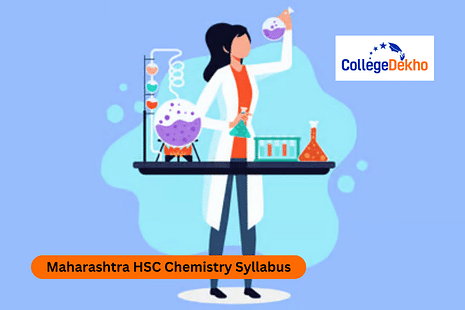

Never Miss an Exam Update
Maharashtra HSC Chemistry Syllabus 2025-26: The Maharashtra State Board of Secondary and Higher Secondary (MSBSHSE) designs the MSBSHSE HSC Chemistry syllabus aligning with the National Education Policy (NEP) 2020 to focus more on the practical applications.
The Chemistry syllabus includes Physical Chemistry, Organic, and Inorganic Chemistry, and Applied Chemistry. The Maharashtra Board 12th Chemistry syllabus is divided into 16 units. Some important chapters in the class 12 chemistry syllabus are Solid State, Solutions and colligative properties, Chemical Thermodynamics and energy, Electrochemistry, p-block Elements, d and f Block Elements, Alcohols, Phenols, and Ethers. In project, there will be scientific investigations involving laboratory testing and collecting information from other sources.
The theoretical part consists of 70 marks, and the remaining 30 marks are for the practical exam. Each student must score a minimum of 35% marks in Chemistry to pass the exam. Maharashtra HSC Chemistry exam will be held in offline mode. In the new
Maharashtra HSC exam pattern 2025-26
, the board has added multiple-choice questions to the paper. These questions consist of 25% of the total questions. Students can check the Maharashtra HSC Chemistry Syllabus for the theory and practical exam here.
Maharashtra HSC Chemistry Syllabus 2025-26
Topics under 16 units include. Find the detailed syllabus in the table below.Topic Name | Subtopic |
|---|---|
Solid State | Classification of solids, unit cell in 2 & 3-dimensional lattices, calculation of density, voids, point defects, electrical and magnetic properties, Band theory of metals, conductors, semiconductors, insulators and n-p type semiconductors. |
Solutions and colligative properties | Types of solutions, concentration of solids in liquids, Raoult’s law elevation of boiling point, solubility of gases in liquids, solid solutions, colligative properties, depression of freezing point, osmotic pressure, determination of molecular masses using colligative properties, Van’t Hoff factor, etc |
Chemical Thermodynamics and energetic | Concepts of system, types of systems, surroundings. Work, heat, energy, extensive and intensive properties, state functions. First law of thermodynamics – internal energy and enthalpy, Hess’ law of constant heat summation, enthalpy of bond dissociation, combustion, formation, atomization, sublimation. Phase transition, ionization and solution and dilution Introduction of entropy as a state function, free energy change for spontaneous and non spontaneous processes, and equilibrium constant. Second and third law of thermodynamics |
Electrochemistry | Redox reactions, conductance in electrolytic solutions, specific and molar conductivity, variations of conductivity with concentration, Kohlrausch’s Law, electrolysis and laws of electrolysis (elementary idea), dry cell –electrolytic and galvanic cells; lead accumulator, EMF of a cell, standard electrode potential, Nernst equation and its application to chemical cells, fuel cells; corrosion. Relation between Gibb’s energy change and emf of a cell. |
Chemical Kinetics | Rate of reaction (average and instantaneous), factors affecting rate of reaction; concentration, temperature, catalyst; order and molecularity of a reaction; rate law and specific rate constant, integrated rate equations and half life (only for zero and first order reactions); concept of collision theory (elementary idea, no mathematical treatment). Activation energy, Arrhenius equation. |
General Principles and Processes of Isolation of Elements | Principles and methods of extraction, reduction electrolytic method and refining |
p-Block Elements | Electronic configuration, occurrence, oxidation states, trends in physical and chemical properties; nitrogen – preparation, properties and uses; compounds of nitrogen; preparation and properties of ammonia and nitric acid, oxides of nitrogen (structure only); Phosphorous-allotropic forms; compounds of phosphorous; preparation and properties of phosphine, halides (PCl3, PCl5 ) and oxoacids (elementary idea only).Group 15 elements, Group 16 elements, Classification of oxides, Group 17 elements, Group 18 elements, etc. |
d and f Block Elements | General introduction, electronic configuration, occurrence and characteristics of transition metals, general trends in properties of the first row transition metals – metallic character, ionization enthalpy, oxidation states, ionic radii, colour, catalytic property, magnetic properties, interstitial compounds, alloy formation preparation and properties of K2 Cr2 O7 and KMnO4. oxidation states, chemical reactivity and lanthanoid contraction and its consequences. |
Coordination Compounds | Coordination compounds – Introduction, ligands, coordination number, colour, magnetic properties and shapes, IUPAC nomenclature of mononuclear coordination compounds, bonding; Werner’s theory, VBT, CFT. isomerism, (structural and stereo) importance of coordination compounds (in qualitative analysis, extraction of metals and biological systems). |
Halogen derivatives of alkanes (and arenas) | Haloalkanes, Haloarenes, stability of carbocations, d-l and R-S configurations. |
Alcohols, Phenols, and Ethers | Nomenclature, physical and chemical properties, methods of preparation, etc |
Aldehydes, Ketones and Carboxylic Acids | Nomenclature, physical and chemical properties, methods of preparation, etc |
Organic Compounds Containing Nitrogen | Amines, Diazonium salts, Cyanides and isocyanides, etc |
Biomolecules | Carbohydrates, Proteins, Vitamins, Nucleic acids, etc |
Polymers | Classification, methods of polymerization, copolymerization, polythene, bakelite, nylon, polyesters, and rubber, Biodegradable, non-biodegradable polymers. |
Chemistry in Everyday life | Chemicals in medicines, Chemicals in food, Cleansing agents |
Read more: Maharashtra HSC Chemistry Exam Pattern 2025-26
Maharashtra HSC Chemistry Practical Syllabus 2025-26
| Topics | Subtopics |
|---|---|
| Chemical Kinetics |
(Any one of the following) :
(a) Effect of concentration and temperature on the rate of reaction between sodium thiosulphate and hydrochloric acid. (b) Analyzing any one of the following reaction rates: (i) Iodide ion reaction with hydrogen peroxide at room temperature using various iodide ion concentrations. (ii) A clock reaction, or reaction between potassium iodate (KIO3) and sodium sulfite (Na2SO3) utilizing starch solution as an indicator. (c) Ethyl acetate hydrolyzes in acid. |
| Thermochemistry | Any one of the following experiments:
i] The enthalpy of potassium nitrate or copper sulphate dissolution.
|
| Electrochemistry | Variation of cell potential in Zn|Zn2+||Cu2+|Cu with change in concentration of electrolytes (CuSO4 or ZnSO4) at room temperature (demonstration). |
| Chromatography (demonstration) |
(i) Using paper chromatography to separate pigments from flower and leaf extracts and calculate Rf values.
(ii) Separation of components found in an inorganic mixture with just two cations (give a list of constituents with a significant variation in Rf values). |
| Preparation of Inorganic Compounds |
(i) Making double salt from potash alum or ferrous ammonium sulfate.
|
| Preparation of Organic Compounds |
(i) p-Nitrocetanilide
(ii) Aniline yellow or 2- Napthol aniline dye. (iii) Iodoform (iv) Phthalic or succinic anhydride. (v) Di-benzal acetone. |
| Tests for the functional groups present in organic compounds |
Unsaturation, alcoholic, phenolic, aldehydic, ketonic, carboxylic and amino (primary) groups.
H. Characteristic tests of carbohydrates, fats and proteins in pure samples and their detection in given food stuffs. |
| Determination of concentration/molarity |
Determination of concentration/molarity of KMnO4 solution by titrating it against a standard solution of:
(i) Oxalic acid (ii) Ferrous ammonium sulphate |
| Qualitative analysis |
1) The identification of two cations from a specified salt combination.
2) The identification of two anions from a specified salt combination. |
How to download Maharashtra HSC Chemistry Syllabus 2025-26?
Students should complete the syllabus of
Maharashtra HSC Board
2025-26 a month before the board exams. Here are the steps to download the Maharashtra HSC Chemistry syllabus 2025-26-26 from the board's official website:
- Step 1: Visit the official website of Maharashtra HSC board - mahahsscboard.in.
- Step 2: Click on the section "Subjects & Syllabus" from the primary menu tab on the Home page.
- Step 3: Select "HSC General Subject Codes and Syllabus" from the dropdown menu.
- Step 4: Selecting the HSC General syllabus option will redirect you to the HSC syllabus page.
Maharashtra Board HSC Chemistry Syllabus 2025-26: Project
Scientific investigations involving laboratory testing and collecting information from other sources.
A few suggested Projects:
1. Analysis of oxalate ions found in guava fruit at various ripening stages.
2. Analysis of the amount of casein found in various milk samples.
3. Making soy milk and comparing it to regular milk in terms of curd formation, temperature effects, etc.
4. Examination of potassium bisulfate's performance as a food preservative about other variables (such as temperature, concentration, and time).
5. Research into how salivary amylase breaks down starch and how temperature and pH affect this process.
6. A comparison of the rates of fermentation of the following substances is conducted: carrot juice, potato juice, wheat flour, gram flour, etc.
7 Essential oil extraction from Illaichi (cardamom), Ajwain (carum), and Saunf (aniseed).
8 Examine common food adulterants in sugar, butter, fat, pepper, turmeric powder, and chili powder.
Maharashtra HSC Chemistry Syllabus 2025-26- Download PDF
The goal of the syllabus is to assist students in developing a comprehensive understanding of chemistry. It covers a broad range of subjects, from more complex organic chemistry concepts to fundamental ideas about atomic structure. A significant practical component of the syllabus enables students to apply their theoretical knowledge to actual experiments. The Maharashtra Board is yet to release the Maharashtra HSC Chemistry Syllabus for the academic year 2025-26. Meanwhile you can download the Maharashtra HSC Chemistry Syllabus 2024-25 PDF .Are you feeling lost and unsure about what career path to take after completing 12th standard?
Say goodbye to confusion and hello to a bright future!

Was this article helpful?























